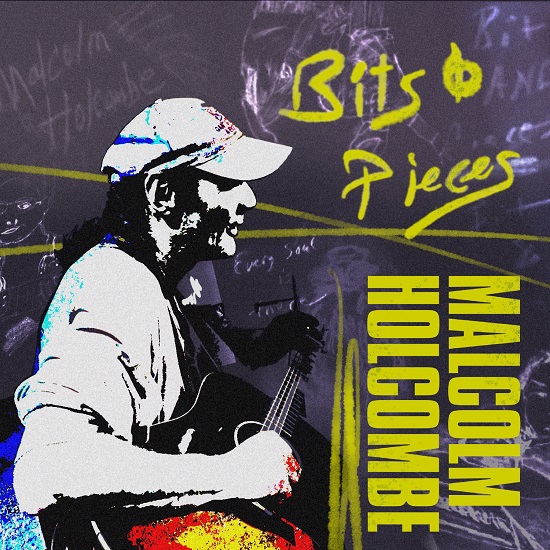
It’s easy to see why Malcolm Holcombe is admired by so many songwriters. His lyrics are economical, perhaps even terse at times, conveying ideas and stories by hints and allusions rather than as a simple narrative and creating rhythmic textures with his finger-picking style. The album’s a two-hander with Jared Tyler supplying tonal colours to Malcolm’s songs (as he has for nearly twenty-five years) with a wide variety of instruments including dobro, lap steel, baritone guitar, tenor banjo, mandola and percussion. Malcolm’s finger-picking and Jared’s backing and fills give the songs a rhythmic complexity that emphasises the starkness of the lyrics.
‘Bits & Pieces’ is an album where Malcolm takes a long look in the rear-view mirror at the times he’s enjoyed and the times he’s survived; there’s a reason for this. Malcolm was diagnosed with cancer in 2022 and decided to record these songs straight away because of the uncertain future. He’s now a cancer survivor as well and this is referenced in ‘Bootstraps’ with the lines “blood bleedin’ in your stomach, saline flowin’ your veins”. Malcolm’s lyrics can be oblique, leaving you wondering whether you’re chasing the right reference, although it’s clear that ‘Eye of the Needle’, ‘Rubbin’ Elbows’ (with the COVID reference) and ‘Another Sweet Deal’ are talking about hucksters and grifters and possibly even the Trump family. You can find a few religious references in there as well, in ‘Eye of the Needle’ mentioned above, ‘Bring to Fly’ and ‘Conscience of Man’. Sometimes you need to delve a little to unpick the references, but it’s always worth the effort.
There are a couple of standouts for me and they’re side by side on the album. ‘The Wind Doesn’t Know You’ takes a whistle-stop tour through Malcolm’s past (‘lock the doors and windows turn the music up louder, from the eighties to the nineties from the pills to the powder’) before acknowledging that in the grand scheme of things, we play a very small part. ‘Conscience of Man’ hints at the early Eagles albums in its arrangements and harmonies as it rails at the American right wing before admitting that redemption might just be possible. And the theme of redemption suffuses the album’s closer ‘Bring to Fly’ to end the album on a positive note.
If you already know Malcolm Holcombe’s work, you’ll find this a very satisfying album. If you don’t know his work, then this is a pretty good place to start.
‘Bits & Pieces’ is out now on Proper Music/Need To Know.
Here’s the lyric video for the album’s title song:
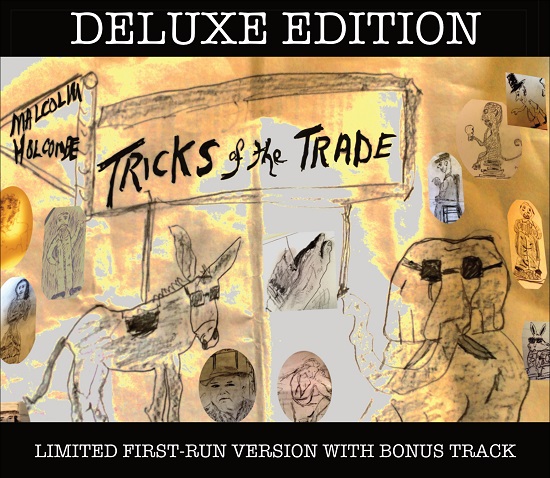
Malcolm Holcombe is one of those songwriters who is quiet rightly revered by music fans and fellow-songwriters alike. He’s been releasing solo material for twenty-seven years now, and the quality of his work never dips; he just goes on writing, playing, beautifully crafted songs in his own country/blues/rock style, singing them in his own distinctive cracked drawl. It’s powerful stuff, even before you get to the lyrical themes of the of the twelve songs on this album (with a bonus thirteenth on the CD version).
Malcolm has been prolific recently with six albums in the last six years despite serious health problems and that small matter of a pandemic. “Tricks of the Trade” marks a progression from his recent work. The addition of electric guitar to Jared Tyler’s string armoury adds a harder cutting edge to the arrangements while Malcolm’s lyric have more of a political edge this time around, which shouldn’t surprise anyone after the events of the last eighteen months.
Musically the stylings move across the roots spectrum from the lap steel-led old country of “Misery Loves Company” through the uptempo acoustic “Crazy Man Blues” to the country rock of “Damn Rainy Day” (with a similar theme to Paolo Nutini’s “Pencil Full of Lead”). Jared Tyler’s electric adds some punch to the album’s closer “Shaky Ground”, while a cello line adds pathos to the love ballad “Lenora Cynthia” and “Higher Ground” has a pumping bassline that evokes the Talking Heads classic, “Psycho Killer”. It’s a strikingly broad musical palette.
The lyrical edge of the album comes, typically for Malcolm Holcombe, with the allusive and indirect political references, leaving the listener to wonder what they actually heard. Just two words in “Higher Ground”, ‘slumlord whitehouse’ convey the Trump genealogy. Donald Trump’s father Fred Trump built up the property empire that the former President inherited and was attacked in song by Woody Guthrie over racial discrimination. That’s a lot of meaning packed in to two words. And while we’re talking about presidents, “On Tennessee Land” highlights the short-sightedness of voters in the Southern states, recalling Lyndon B Johnson’s comment: ‘If you can convince the lowest white man he’s better than the best colored man, he won’t notice you’re picking his pocket.’ The title song can be interpreted as a commentary on political trickery or, like the opener “Money Train”, the machinations of the music business; there are always layers within layers in Malcolm Holcombe’s songs.
“Tricks of the Trade” is the real thing. Malcolm Holcombe has taken his very personal songwriting style in a more political direction while still retaining the subtlety of lyrical expression that typifies his work. Take the time to peel way the layers and you’ll find a very satisfying album that will stay with you.
“Tricks of the Trade” is released in the UK on Friday August 20th.
Here’s the video for the opening song “The Money Train”:
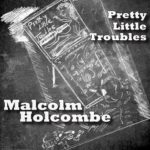 “Pretty Little Troubles”; it’s a lovely example of irony. Malcolm Holcombe’s troubles are never little and they’re rarely pretty. The subjects of his songs may be everyday events, but they have huge significance to the protagonists. It’s fair to say that he’s revered by fellow artists and songwriters for both live and recorded work and this album’s another demonstration of the passion and unshowy skill of his songs. His style is firmly in the country/Americana tradition with hints of other roots showing through occasionally in the lilting Celtic- styled “The Eyes O’ Josephine” where the bass doubles up the guitar riff and the song’s completed with a penny whistle solo and the European-influenced story of an encounter with a female busker playing a concertina, “South Hampton Street”. Both songs evoke the setting perfectly without tipping over into pastiche.
“Pretty Little Troubles”; it’s a lovely example of irony. Malcolm Holcombe’s troubles are never little and they’re rarely pretty. The subjects of his songs may be everyday events, but they have huge significance to the protagonists. It’s fair to say that he’s revered by fellow artists and songwriters for both live and recorded work and this album’s another demonstration of the passion and unshowy skill of his songs. His style is firmly in the country/Americana tradition with hints of other roots showing through occasionally in the lilting Celtic- styled “The Eyes O’ Josephine” where the bass doubles up the guitar riff and the song’s completed with a penny whistle solo and the European-influenced story of an encounter with a female busker playing a concertina, “South Hampton Street”. Both songs evoke the setting perfectly without tipping over into pastiche.
The transatlantic folk/roots community has almost unanimously distanced itself from the alt-right and Malcolm Holcombe’s affirmation of that stance comes in “Yours No More”, a hymn of praise to the immigrants that helped to build America. It’s not in-your-face radicalism, it’s a gentle reminder that we can all use a bit of historical perspective at times. His rough-hewn, two-packs-a-day voice rasps through the rockier numbers, but adds pathos to the more contemplative stories of the numbing grind of everyday existence, such as “Damn Weeds” and the album’s closer “We Struggle”; the problems may be small in the grand scheme of things, but they can seem like insurmountable objects when you get right up close and personal.
There area couple of great turnaround songs on the album as well. The uptempo “Good Old Days” feels like a nostalgic romp until the lyrics turn to exploitation, disease , alcohol and dead babies and “Bury England” paints a stark picture of life as a travelling musician, depicting all the minor frustrations (terrible coffee) which are displaced by hearing great music on the house PA (in memory of Guy Clark) then going on to play a great gig with Jared Tyler. Malcolm Holcombe has the songwriter’s skill of creating a perfect vignette from a seemingly mundane series of events and even the title is an ironic play on the phrase ‘Merry England’.
It’s raw at times, but “Pretty Little Troubles” is packed with lovingly-crafted and passionate songs played in atmospheric and uncluttered settings. It’s a lovely piece of work.
“Pretty Little Troubles” is released on Friday May 26 on Gypsy Eyes Music.
 From close up you can see that Malcolm Holcombe’s life has been an eventful journey. While he’s offstage he looks frail, tired and just about holding things together; when he picks up a guitar and sits in front of a microphone, there’s a complete transformation. It’s impossible to tell if he’s just conserving all of his energy for those two forty-five minute slots or there’s some mojo that he can only call on while he’s playing and singing, illuminating him from within and creating an almost impossible level of intensity. Even the way he attacks the opening set, running songs into each other without a pause of even a fraction of a second to allow a bit of audience appreciation has the feel of a man on a mission. It’s powerful, intense and unpredictable but, like great art, it isn’t always comfortable.
From close up you can see that Malcolm Holcombe’s life has been an eventful journey. While he’s offstage he looks frail, tired and just about holding things together; when he picks up a guitar and sits in front of a microphone, there’s a complete transformation. It’s impossible to tell if he’s just conserving all of his energy for those two forty-five minute slots or there’s some mojo that he can only call on while he’s playing and singing, illuminating him from within and creating an almost impossible level of intensity. Even the way he attacks the opening set, running songs into each other without a pause of even a fraction of a second to allow a bit of audience appreciation has the feel of a man on a mission. It’s powerful, intense and unpredictable but, like great art, it isn’t always comfortable.
On this tour, Malcolm has been joined by slide resonator player Jared Tyler, whose pure clear harmonies contrast perfectly with Malcolm’s forty-Marlboro-a-day, rusty razor wire baritone. His slide playing creates fills and additional backing for Malcolm’s style of picking and thumb-strumming; it’s a really effective combination of two voices and two instruments. The onstage chat between songs is inconsequential, bordering on random, but the audience isn’t there to hear chat; they want to hear the songs.
The focus is on the latest album, “Another Black Hole” with more than half of the album’s songs featuring on the night. The title track, “Sweet Georgia”, “Way Behind”, and “Leavin’ Anna” all get an enthusiastic response, but the biggest cheer of the night is for the storming “Papermill Man” towards the end of the first set. There’s a fair amount of older material as well, including “Sparrows and Sparrows”, “Down the River” and “Savannah Blues” (featuring some lovely ebow guitar from Jared) and even a version of the Maura O’Connell song “A Far Cry”. It’s a great bunch of songs and the new material is as good as anything he’s ever done.
If you’ve heard any of the songs before you can guess that Malcolm’s a man who’s had battles with his demons and it’s difficult to say who won (maybe he’ll be happy to last the full fifteen rounds). At times onstage he’s struggling for breath and you’re just willing him to make it to the end of the song, never mind the evening, but there’s a fire burning inside that won’t be easily quenched. It’s not for the faint-hearted, but Malcolm Holcombe live is an experience you won’t forget in a hurry.
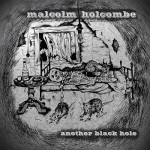 It’s just over six months since Malcolm Holcombe’s last album “The RCA Sessions” was released, so he’s obviously not spinning his wheels at the moment. “The RCA Sessions” was a retrospective with a twist, while “Another Black Hole” is ten new songs in the inimitable Malcolm Holcombe style. If your idea of a great voice is the kind of sanitised autotuned pap that you hear all over the radio, then we’d better say goodbye right here. Malcolm Holcombe has a voice that’s full of rugged character, matching the themes of his songs to perfection. As he sings in the title song, ‘The radio plays for the happy go lucky, that ain’t my set o’ wheels’.
It’s just over six months since Malcolm Holcombe’s last album “The RCA Sessions” was released, so he’s obviously not spinning his wheels at the moment. “The RCA Sessions” was a retrospective with a twist, while “Another Black Hole” is ten new songs in the inimitable Malcolm Holcombe style. If your idea of a great voice is the kind of sanitised autotuned pap that you hear all over the radio, then we’d better say goodbye right here. Malcolm Holcombe has a voice that’s full of rugged character, matching the themes of his songs to perfection. As he sings in the title song, ‘The radio plays for the happy go lucky, that ain’t my set o’ wheels’.
Throughout “Another Black Hole”, most of the usual collaborators are present, including Jared Tyler, David Roe and Ken Coomer and there are a couple of guest appearances from the legendary Tony Joe White, notably on the album’s rockiest song “Papermill Man”, which combines the themes of nostalgia and life at the bottom of the ladder that run through the album with a raucous, rambunctious musical romp.
The language and imagery are more measured, but this album reminds me of Springsteen’s “Wrecking Ball”, contrasting the Carveresque characters of the songs with the ‘suits and ties in the cubicles’ (“To Get By”) and the Vanderbilts who ‘hold the keys to the city’ (“Papermill Man”). If there was any doubt about where Malcolm Holcombe’s sympathies lie, “Don’t Play Around” nails it with the line ‘fuckin’ damn frackin’ and backroom stabbin’ knocks me down on my knees’. This is the ordinary, everyday Joe sitting in a bar and venting his anger over a beer before going outside to smoke a cigarette (and he makes it clear where that highway’s always going to end).
Malcolm’s voice may be a taste that you need to acquire, but the songs on “Another Black Hole” are beautifully-crafted vignettes of American life on the other side of the tracks, just out east of Eden. The playing’s perfect throughout, matching the music to the lyrical themes, without ever becoming overcooked. What more do you need?
Out now on Gypsy Eyes Music.
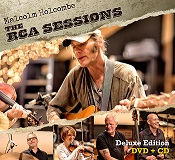 OK, let me say this right up front; this album isn’t for everyone, but you could say that about Tom Waits, Neil Young and Bob Dylan and it hasn’t done them any harm. Malcolm Holcombe’s voice is an acquired taste but if you already have a taste for anyone mentioned above then it wouldn’t take a lot of acquisition. It’s the voice of a man who’s lived a life and seen a lot of dark sides; it’s the voice of a man who gargles with gravel, spits sparks and tells stories of how life is, not how you think it should be. His music has roots in blues, folk and country but it’s not really any of these; it’s a strand of Americana which weaves in all of these influences without falling neatly into any of them.
OK, let me say this right up front; this album isn’t for everyone, but you could say that about Tom Waits, Neil Young and Bob Dylan and it hasn’t done them any harm. Malcolm Holcombe’s voice is an acquired taste but if you already have a taste for anyone mentioned above then it wouldn’t take a lot of acquisition. It’s the voice of a man who’s lived a life and seen a lot of dark sides; it’s the voice of a man who gargles with gravel, spits sparks and tells stories of how life is, not how you think it should be. His music has roots in blues, folk and country but it’s not really any of these; it’s a strand of Americana which weaves in all of these influences without falling neatly into any of them.
“The RCA Sessions” is a retrospective with a difference. Malcolm Holcombe has picked out sixteen songs from the period 1994-2014 and re-recorded the lot live in the RCA Studios in Nashville, while filming the process for a CD/DVD package. The band for the sessions was Jared Tyler (dobro, electric guitar, lap steel and vocals), Dave Roe (upright bass and arco), Tammy Rogers (fiddle, mandolin and vocals), Ken Coomer (drums and percussion) Jelly Roll Johnson (harmonica) and Siobhan Maher-Kennedy (vocals), all regular contributors to Malcolm’s work, plus Maura O’Connell who duets on the final track, “A Far Cry from Here”.
This collection weaves its way through various instrumental settings, from the intimate Malcolm Holcombe/Jared Tyler configuration on “Doncha Miss that Water” (with a hint of Jackson Browne and David Lindley) to the full country band sound of “My Ol’ Radio”, the riff-based country rock of “To Drink the Rain” and the two songs featuring Jelly Roll Johnson’s harmonica, “Mister in Morgantown” and “Mouth Harp Man”.
There’s a melancholy lyrical feel to most of the album, from the mournful mood of “The Empty Jar” to the world-weary nostalgia of “Early Mornin’” and “Goin’ Home”. There’s a bit of social comment (“Down the River”) and even a parable (“I Call the Shots”), showing a wide range of subjects and lyrical styles. The imagery is never ornate or flowery; this is the poetry of everyday (and sometimes bone-grindingly hard) life; warts ‘n’ all with no airbrushing, but also incredibly powerful, honest and moving.
The songs on “The RCA Sessions”, selected from the work of twenty years, are strong, potent and evocative and paint a picture of someone who’s lived a life and just managed to survive it. At times you feel he squeezes so much of himself into the songs, you wonder if he can make it to the bridge, never mind to the end of the song, but you could often say that about Neil Young, Tom Waits and Bob Dylan as well. Anyway, Lucinda Williams and Justin Townes Earle are fans and I’m sure their recommendation counts for a lot more than mine.
“The RCA Sessions” is out on June 22 on Singular Recordings/Gypsy Eyes Music.


